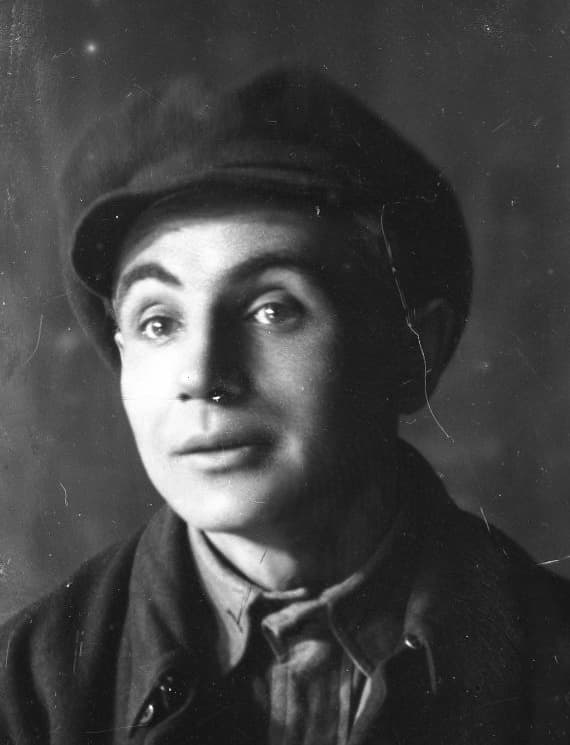Based on the drama by Prosper Mérimée
Script adapted by Pavlo Shcherbatynskyi
Premier: November 12, 1925
Director: Borys Tiahno
Member of Director’s Lab: Lishanskyi
Assistant: Skliarenko
Artists: Valentyn Shkliaev, Maiia Symashkevych
Conductor: M. Pokrovskyi, B. Kryzhanivskyi
Anatolii Butskyi – song of the gray wolves, abbey and maidan
Mykhailo Verykivskyi – intro march to 2nd act, intro to 4th act, finale
Assistant Director: O. Savytskyi
Stage Engineer: K. Dombrovskyi, I. Chaplyhin
Gray Wolf – S. Shahaida, O. Romanenko
Osaul – S. Svashenko
Wilfried – Ivaniv, Nazarchuk
Godfrey the Cripple – Podorozhnyi, A. Makarenko
The New One – Havryshko
Baron d’Apremont – L. Serdiuk
Isabelle, His Daughter – Chystiakova, Nashchadymenko, Pilinska, Dobrovolska
Conrad, Their Son – N. Tytarenko, Babiivna, V. Stukachenko
Seneschal, Baron’s Butler – M. Ilchenko
Court Jester – B. Balaban, Nazarchuk
Bonen, Teacher – Savchenko
Marion – Steshenko, Babiivna, Smereka
Pierre – Masokha, Koshevskyi
First Page – O. Pihulovych
Second Page – S. Lor
Khoma – M. Kononenko
Renot – S. Khodkevych
Moran – S. Karpenko
Simon – V. Stetsenko
Bartelemi – Novyk, Makarenko
Galion – S. Svashenko
Marta – E. Petrova
Jeanetta – L. Babenko
First Peasant – Zhadanivskyi
Second Peasant – Havryshko
Third Peasant – O. Ivashutych, Ivaniv
Fourth Peasant – Zakharchuk
Abraham – F. Radchuk, Spishynskyi
Sir de Belille, King’s Envoy – Y. Hirniak
Monks:
Brother Jean – A. Buchma
Honore – M. Krushelnytski
Sulpitius – A. Shutenko
Goderan – O. Podorozhnyi
Ignacious – K. Savchenko
Knights:
D’Acuni Lasignac – O. Podorozhnyi
de Courcy – H. Drozd, Bilashenko
de Boissy – V. Stukachenko, Voziian
Sir Buduen – V. Stukachenko, Drobinskyi
Saint-Croix – K. Radchuk, Spishynskyi
First Lady – H. Babiivna, Kuzmenko
Second Lady – L. Datsenko
Third Lady – E. Petrova
Fourth Lady – L. Babenko
Fifth Lady – V. Bzheska, Kosakivna
Seward, English Knight – D. Babenko
Brown, Archer – P. Kovbasiuk, Drobinskyi
Scientist – F. Radchuk
Gray Wolves, Soldiers, Peasants, Englishmen, Monks, Knights, Servants
The epic tragedy La Jacquerie, based on the historical drama by French writer Prosper Mérimée, was staged at the Berezil Artistic Association in 1925. The production was an adaptation written by Pavlo Shcherbatynskyi. Before the Director’s Lab approved the production plan, Kurbas’s student Borys Tiahno had presented his idea for the show six times.
The journal New Art published the program along with a libretto that provided readers with a synopsis of the show. The story immersed the audience in the 14th century, during the short but bloody revolution by French peasants known as the Jacquerie. According to the libretto, “This peasant movement has gone down in history for the horrible number of peasants tortured and sentenced to death.”
It was already clear from the libretto that Berezil was interested in more than reconstructing French historical events: the audience was supposed to make associations and analogies with historical events in Ukraine. “Just as the Ukrainian peasants (Chyhyryn rebellion) once rebelled against the landowners and maintained their faith in the king’s justice, the jacquerie maintained their religious devotion to the king and leading them were knightly monks and random people motivated solely by their personal interests. These ‘leaders’ took advantage of another opportunity to achieve their goal at the expense of the ‘gray wolves.’”
According to theater critic Natalia Yermakova, Kurbas warned Borys Tiahno that the show “should not end with any propaganda,” on the contrary, he should “leave the peasants defeated and thus enhance the tragic pathos of the work.” The final scene of La Jacquerie ended with an eclipse, which became a symbol of the tragic defeat of the popular uprising.
The show was an overwhelming success. La Jacquerie was called a highlight in the history of Ukrainian theater, a great artistic phenomenon. One newspaper wrote: “La Jacquerie is a huge success. Every show is sold out. The acting is wonderful. Artistic circles in Kyiv consider La Jacquerie a remarkable event in theatrical life.” But its success is attributed not only to the young director Borys Tiahno but to Berezil head Les Kurbas – an active participant in the creation of the show. Critic V. Pysarevskyi, writing under the pseudonym Kaplia-Yavorskyi, wrote: “So, given the responsibility and meaning of La Jacquerie, the director was under the direct supervision and guidance of the main director L. Kurbas, who also contributed much artistic work. This is important to developing a unified directorial school.”
Theater critics wrote about the masterfully designed scenery and magnificent performances by actors such as Buchma in the role of Jean, “the fanatic leader of the jacquerie,” Hirniak as the King’s messenger Sir de Belille – “the cunning intriguer,” Serdiuk as the baron – “a stupid and cruel despot,” Shahaida as the Gray Wolf, who created “a monumental image of a bandit,” Krushelnytskyi as Brother Honore, “a Jesuit monster,” and others. All the roles, even the episodic ones, were described as having been performed skillfully.
Critics also noted the high quality of the work of the director, actors and stage engineer. The artists were Valentyn Shkiaev and member of the Berezil Artistic Association Director’s Lab Maiia Symashkevych. The Gothic arches and costumes were very impressive. Other reviews also mentioned the brilliant work of composers Anatolii Butskyi and Mykhailo Verykivskyi, saying that everyone involved in the show proved themselves to be true masters. Theater critic Nataliia Chechel, who later reconstructed the show, wrote: “The music in La Jacquerie, which was written by two different composers, was very dramatic. The introductory marches to the second and fourth acts were written by M. Verykivskyi. The composer, whose music is known for melodies based on Ukrainian folklore, gave the show’s folk theme a lyrically sound. The sharper tones in the music by A. Butskyi matched the bleak and heroic atmosphere of the Middle Ages, while M. Verykivskyi’s music had elements of folk tunes. The mood of some episodes was intensified by sad and cheerful folk melodies.”
La Jacquerie won recognition among artistic circles and the average audience alike, as evidenced by the constantly sold out shows. This great artistic victory by Berezil allowed poet and critic Yakov Savchenko to enthusiastically state: “I am not afraid to say that La Jacquerie is a classic!”

